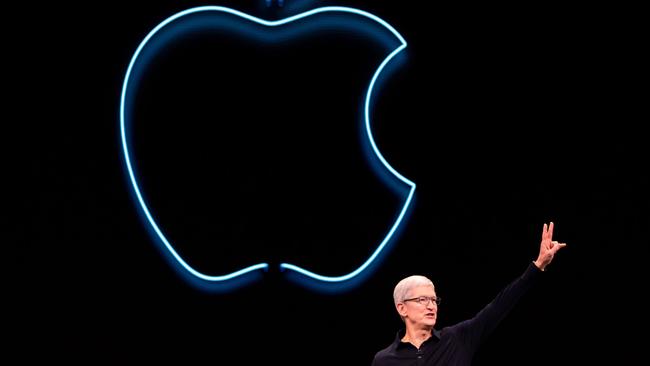Day the music died for Apple’s iTunes
The demise of iTunes shows the real money in recorded music has moved to streaming.

For much of the past two decades, if you wanted to pay to download a song or album, it’s likely that your first port of call was iTunes, the digital music platform developed and administered by Apple.
After its launch as a media player in 2001, then as an online store in 2003, iTunes came to be viewed as a saviour by despairing music industry executives who had seen sizeable chunks of their profits fall away once millions of tech-savvy listeners began file-sharing without paying to play.
By 2006, the iTunes music store had sold its one billionth song: Speed of Sound by British rock band Coldplay. It was purchased by a teenager in Detroit.
Yesterday, that era came to a close when Apple chief executive Tim Cook announced in California that the software was being retired, with the company opting to split into separate apps for music, TV and podcasts. The end of iTunes was announced as Apple launched a powerful new Mac Pro, and vastly extended the iPad’s capability.
Among a slew of updates unveiled at the Apple Worldwide Developer Conference in San Jose, Apple Watch now has its own app store, the iPad has its own operating system and Siri can read messages to you while you listen to music on your AirPods.
Mr Cook’s iTunes announcement — more than simply pulling the shutters down on a digital storefront in the same way so many music stores have closed their doors — can be read as among the strongest signals yet that the real money in recorded music has moved towards the business of streaming.
Under subscription models designed by the likes of Spotify and Apple Music, listeners pay a fixed monthly fee to hear as much music as their hearts desire, rather than the iTunes model of buying individual tracks or albums.
This shift in consumer behaviour has been evident for so long that the news of the demise of iTunes was greeted as more of an inevitability than with any true sense of surprise.
Between 2017 and 2018, digital track and album sales fell by 26 per cent and 31 per cent, while subscription-services income grew 43 per cent to $304 million.
Five years ago, those numbers were vastly different. In 2014, digital music sales accounted for 59 per cent of the Australian music market, ARIA said, with streaming accounting for about 10 per cent of that figure after Spotify launched here in 2012.
The move away from ownership, whether in the form of physical product or a file saved to your computer or phone, has long been a cause for concern for artists, whose earnings for each streamed song play is measured in fractions of a cent, rather than the dollars and cents they might have earned from a CD sale.
But ownership has long been something of a fuzzy notion: if your music collection is either stored in the cloud or as encrypted files on your phone, do you truly own any of those songs?
While iTunes led to an undoubted boon for the recorded music industry, with lifetime sales well in excess of 35 billion songs , it was also at the centre of an incident that prompted a howl of outrage that still echoes today.
In 2014, Irish rock band U2 cut a deal with Apple to boost the release of its 13th album, Songs of Innocence. In what was dubbed at the time as the largest album release in history, those 11 songs suddenly appeared in the library of about 500 million iTunes account holders worldwide.
It was a great gift to fans of U2. Not so great if you had no interest in hearing its new music.
Additional reporting: Chris Griffith




To join the conversation, please log in. Don't have an account? Register
Join the conversation, you are commenting as Logout